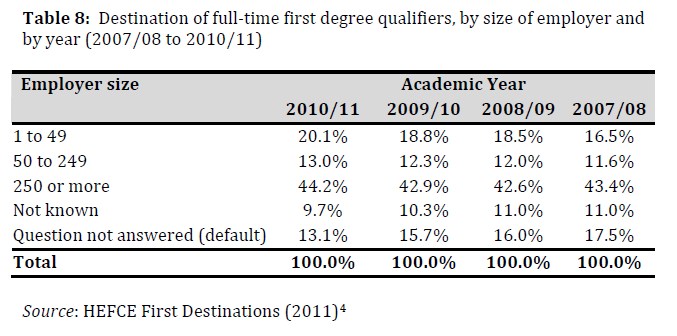Careers fairs are false advertising. By that I mean they present an image of the world of work that is heavily skewed towards big business. PwC, Deloitte, Rolls Royce, Bloomberg – all are present at nearly every university campus across the country. Yet bar the odd exception, small businesses are few and far between.
I know this from first-hand experience. When I graduated from university in 2008, I diligently did laps of the Manchester careers fair circuit looking for a different kind of employer – to little avail. Of course that was over 5 years ago and things could have changed since then. But judging from a recent paper by the research organisation SFEDI, the lack of engagement between graduates and small firms remains as problematic as ever.
Their report shows that just 20 per cent of all graduates in 2010/11 found employment in a small firm (1-49 employees), compared to 44 per cent who found a job in a large one (250+ employees) (See the table below). This is despite small firms employing a third of the UK workforce – a figure that looks set to grow should current trends keep pace. Little wonder that an overwhelming 95 per cent of graduate careers heads say that SME recruitment is an area in need of addressing.

Part of the problem lies with the attitudes of small business owners. Many think graduates are too much effort to manage, or that they’ll scarper not long after they arrive. Others perceive that they simply don't have time to deal with the paperwork and hassle of the recruitment process itself. If you’re a firm of 5 employees, just a single day being distracted by other tasks can cause havoc. Better simply to hire an old hand or family friend.
As always, however, the issue lies as much with demand as it does with supply. Even when small firms see the benefit of recruiting a young graduate, that feeling may not be reciprocated. According to the same SFEDI study, many graduates believe small firms pale in comparison to large ones when it comes to pay, working conditions, opportunities for career progression and so on. Parents are an obstacle too, with many keen for their child to work in a global firm with a big brand attached. Most small firms simply can’t offer the same kind of status or grandeur people are looking for.
Yet perhaps the biggest problem is that we have a higher education system that is heavily biased towards big business. Universities do their utmost to meet the needs of major corporates – from giving them a platform at graduate careers fairs, to tailoring course content to suit their needs, to designing completely bespoke undergraduate studies - something that Morrisons and an increasing number of other major firms are now operating.
Of course, most of this is done with the admirable goal to enhance the employability of students. Yet it ignores the huge benefits that young people can accrue from working in a small firm. Indeed, small business environments arguably provide more autonomy and greater opportunities to progress (things that millennials are said to prize over the size of their salary). It's also a great deal more exciting being at the coalface of a business, particularly one that is growing rapidly. This is why initiatives such as Enternships and the New Entrepreneurs Foundation, which place graduates in fast growing businesses, are attracting so much interest.
The task for universities is to take this message out there to both students and local businesses, and convince them of the benefits of working together. It would be a lot better than peddling the myth that big businesses are the only option open to graduates.
The RSA and Etsy are exploring similar themes in a new project, The Power of Small.


Be the first to write a comment
Please login to post a comment or reply.
Don't have an account? Click here to register.